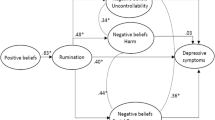Abstract
Rumination has attracted increasing theoretical and empirical interest in the past 15 years. Previous research has demonstrated significant relationships between rumination, depression, and metacognition. Two studies were conducted to further investigate these relationships and test the fit of a clinical metacognitive model of rumination and depression in samples of both depressed and nondepressed participants. In these studies, we collected cross-sectional data of rumination, depression, and metacognition. The relationships among variables were examined by testing the fit of structural equation models. In the study on depressed participants, a good model fit was obtained consistent with predictions. There were similarities and differences between the depressed and nondepressed samples in terms of relationships among metacognition, rumination, and depression. In each case, theoretically consistent paths between positive metacognitive beliefs, rumination, negative metacognitive beliefs, and depression were evident. The conceptual and clinical implications of these data are discussed.
Similar content being viewed by others
References
American Psychiatric Association. (1994). Diagnostic and statistical manual of mental disorders (4th ed.). Washington, DC: Author
Bentler, P. M. (1995). EQS structural equations program manual. Encino, CA: Multivariate Software, Inc.
Bentler, P. M., & Wu, E. J. C. (1995). EQS for Windows user's guide. Encino, CA: Multivariate Software, Inc.
Cartwright-Hatton, S., & Wells, A. (1997). Beliefs about worry and intrusions: The Meta-Cognitions Questionnaire and its correlates. Journal of Anxiety Disorders, 11, 279–296.
Flavell, J. H. (1979). Metacognition and cognitive monitoring: A new area of cognitive–developmental inquiry. American Psychologist, 34, 906–911.
Ingram, R. E. (1984). Toward an information processing analysis of depression. Cognitive Therapy and Research, 8, 443–478.
Just, N., & Alloy, L. B. (1997). The response styles theory of depression: Tests and an extension of the theory. Journal of Abnormal Psychology, 106, 221–229.
Kuehner, C., & Weber, I. (1999). Responses to depression in unipolar depressed patients: An investigation of Nolen-Hoeksema's response styles theory. Psychological Medicine, 29, 1323–1333.
Lyubomirsky, S., & Nolen-Hoeksema, S. (1993). Self-perpetuating properties of dysphoric rumination. Journal of Personality and Social Psychology, 65, 339–349.
Lyubomirsky, S., & Nolen-Hoeksema, S. (1995). Effects of self-focused rumination on negative thinking and interpersonal problem solving. Journal of Personality and Social Psychology, 69, 176–190.
Morrow, J., & Nolen-Hoeksema, S. (1990). Effects of responses to depression on the remediation of depressive affect. Journal of Personality and Social Psychology, 58, 519–527.
Nolen-Hoeksema, S. (1991). Responses to depression and their effects on the duration of depressive episodes. Journal of Abnormal Psychology, 100, 569–582.
Nolen-Hoeksema, S., Larson, J., & Grayson, C. (1999). Explaining the gender difference in depressive symptoms. Journal of Personality and Social Psychology, 77, 1061–1072.
Nolen-Hoeksema, S., & Morrow, J. (1991). A prospective study of depression and posttraumatic stress symptoms after a natural disaster: The 1989 Loma Prieta earthquake. Journal of Personality and Social Psychology, 61, 115–121.
Nolen-Hoeksema, S., & Morrow, J. (1993). Effects of rumination and distraction on naturally occurring depressed mood. Cognition and Emotion, 7, 561–570.
Nolen-Hoeksema, S., Parker, L. E., & Larson, J. (1994). Ruminative coping with depressed mood following loss. Journal of Personality and Social Psychology, 67, 92–104.
Papageorgiou, C., & Wells, A. (1999a). Process and metacognitive dimensions of depressive and anxious thoughts and relationships with emotional intensity. Clinical Psychology and Psychotherapy, 6, 156–162.
Papageorgiou, C., & Wells, A. (1999b, November). Dimensions of depressive rumination and anxious worry: A comparative study. Paper presented at the 33rd Annual Convention of the Association for Advancement of Behavior Therapy, Toronto, Canada.
Papageorgiou, C., & Wells, A. (2000). Treatment of recurrent major depression with attention training. Cognitive and Behavioral Practice, 7, 407–413.
Papageorgiou, C., & Wells, A. (2001a). Metacognitive beliefs about rumination in recurrent major depression. Cognitive and Behavioral Practice, 8, 160–164.
Papageorgiou, C., & Wells, A. (2001b). Positive beliefs about depressive rumination: Development and preliminary validation of a self-report scale. Behavior Therapy, 32, 13–26.
Papageorgiou, C., Wells, A., & Meina, L. J. (2001). Development and preliminary validation of the Negative Beliefs about Rumination Scale. Manuscript in preparation.
Siegle, G. J., Sagrati, S., & Crawford, C. E. (1999, November). Effects of rumination and initial severity on response to cognitive therapy for depression. Poster session presented at the 33rd Annual Convention of the Association for Advancement of Behavior Therapy, Toronto, Canada.
Teasdale, J. D., & Barnard, P. J. (1993). Affect, cognition and change: Re-modelling depressive thought. Hove, UK: Erlbaum.
Wells, A. (1990). Panic disorder in association with relaxation induced anxiety: An attentional training approach to treatment. Behavior Therapy, 21, 273–280.
Wells, A. (2000). Emotional disorders and metacognition: Innovative cognitive therapy. Chichester, UK: Wiley.
Wells, A., & Carter, K. (2001). Further tests of a cognitive model of generalized anxiety disorder: Metacognitions and worry in GAD, panic disorder, social phobia, depression, and nonpatients. Behavior Therapy, 32, 85–102.
Wells, A., & Matthews, G. (1994). Attention and emotion: A clinical perspective. Hove, UK: Erlbaum.
Zimmerman, M., Coryell, W., Corenthal, C., & Wilson, S. (1986). A self-report scale to diagnose major depressive disorder. Archives of General Psychiatry, 43, 1076–1081.
Author information
Authors and Affiliations
Corresponding author
Rights and permissions
About this article
Cite this article
Papageorgiou, C., Wells, A. An Empirical Test of a Clinical Metacognitive Model of Rumination and Depression. Cognitive Therapy and Research 27, 261–273 (2003). https://doi.org/10.1023/A:1023962332399
Issue Date:
DOI: https://doi.org/10.1023/A:1023962332399




